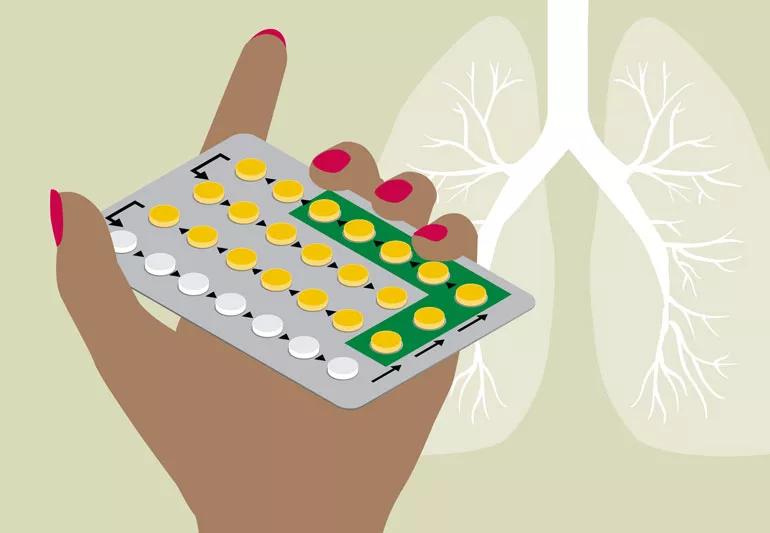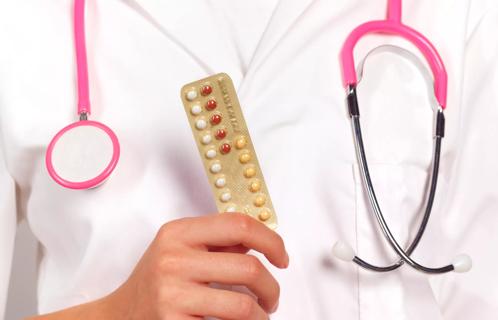Here’s what experts say about how the two are related

If you’re looking to avoid pregnancy, there are multiple birth control options available. These include nonhormonal kinds, such as condoms, diaphragms, cervical caps or sponges. Other people prefer hormone-based options such as the pill, a contraceptive patch or a vaginal ring.
But hormonal birth control can increase your risk of developing blood clots, says Ob/Gyn Ashley Brant, DO. The risk is small, though — at most, 10 in 10,000 people per year develop these clots as a result of being on birth control — and only hormonal birth control that contains estrogen increases your risk. In fact, you’re more likely to develop a blood clot from pregnancy than you are from hormonal birth control.
Advertisement
Cleveland Clinic is a non-profit academic medical center. Advertising on our site helps support our mission. We do not endorse non-Cleveland Clinic products or services. Policy
For perspective, however, blood clots “are pretty rare in people of reproductive age,” Dr. Brant says. “If you aren’t on any contraception, the chance of developing a venous thromboembolism (blood clot) is somewhere between 1 and 5 per 10,000 people per year.”
Hormonal birth control generally comes in two forms. One type contains estrogen and progestin, while the other type contains progestin only. Estrogen has been linked to the increased risk of blood clots, as it increases the levels of clotting factors — though, healthcare providers are still trying to completely understand the link.
Certain kinds of pills, the contraceptive patch and vaginal ring have both kinds of hormones. If you want to avoid estrogen in your birth control, there are other methods available that don’t include it. Progestin-only birth control methods include pill, injection and implant options. “There are also a few different IUDs, or intrauterine devices, with progestin,” she adds. “However, you can also get a nonhormonal IUD.”
Birth control pills with higher doses of estrogen increase your risk of developing blood clots. However, “the modern kind with lower-dose formulations of estrogen are much lower risk than what they used to be a couple decades ago,” weighs in vascular internist Deborah Hornacek, MD.
Advertisement
For example, in the 1970s and 1980s, birth control pills typically contained 50 micrograms of estrogen. “And now, the highest pill that anyone prescribes is around 35 micrograms,” says Dr. Brant. “They can even have 20 micrograms and lower today.”
The kind of blood clots you may develop from hormonal birth control are different from other blood clots that are related to your menstrual cycle. “Sometimes, people interpret blood clots from birth control as ones you get from vaginal bleeding,” says Dr. Brant. “However, we mean blood clots that develop in the blood vessels of your legs or lungs.”
That being said, Dr. Brant says doctors are still trying to understand the link between hormonal birth control and blood clots. “Your liver makes dozens of pro-clotting and anti-clotting factors,” she notes. “The thought is that the estrogen influences the way that the liver makes those pro-clotting factors.
However, there are “dozens of different factors” involved in the clotting process, she adds. “It’s not super clear how they all interact with each other — and exactly where estrogen is exerting the most effect.”
Timing might also play a part. In fact, you’re most likely to have a birth control-related blood clot when you’ve just recently started taking it. “From the first several months up to the first year is the highest risk time period because your hormone levels are actually changing,” Dr. Hornacek says.
Hormonal birth control that contains estrogen is the type that causes blood clots. The pill and the ring appear to have similar risks for estrogen-containing birth control.
But researchers have found mixed data about the patch — namely, that it might have a higher risk of blood clots as compared to the other two kinds. “Plenty of doctors or healthcare providers still prescribe the patch,” says Dr. Brant. “But you’ll want to talk to your doctor before starting this.”
Pregnancy increases your risk of developing blood clots. “Birth control pills, even the combined ones, are safer than pregnancies. The risk is generally 10 to 20 clots per 10,000 people per year,” says Dr. Brant.
This elevated risk is related to hormonal and body changes that happen in pregnancy. “Basically, you have a big mass in your belly that is slowing down the blood returning to your heart from your legs,” explains Dr. Brant. “That’s why people get swelling in their lower extremities. That also contributes to the increased blood clot risk in pregnancy.”
This risk doesn’t end once you give birth, though. In fact, the increased blood clot risk stays high even in the postpartum period. “The first six weeks postpartum are even higher risk than the pregnancy itself,” she says.
Advertisement
In general, one of the biggest signs of a blood clot is pain. “Usually the pain would be behind your knee or in the back of your calf,” says Dr. Brant. Redness or swelling are also common. “Sometimes, you can even develop a ropey-like firmness in the back of your leg. It’s the actual vein, and you can feel it.”
Blood clots that happen while people are using birth control vary in size and severity. These can develop in your artery or, more commonly, in a vein. When a clot develops in your vein, it’s called deep vein thrombosis and blocks your normal circulation.
Sometimes, the clot stays in place, while other times, it might break off and travel to another part of your body.
This can be serious. For example, if part of the clot travels to your lungs, it could stop blood flow there and cause a more severe complication called pulmonary embolism.Signs of a pulmonary embolism specifically include shortness of breath, coughing or chest pain.
In general, if you don’t quite feel right — especially if you’ve just started taking hormonal birth control — call your doctor. “If you’re having symptoms such as pain, warmth, redness or swelling — or if the symptom is affecting a lower extremity — that’s a reason to check in,” warns Dr. Brant.
Advertisement
Based on what you report, your doctor can help you figure out the best next steps. “They’ll help you decide whether it’s appropriate to go to the emergency room, if you need an ultrasound or whether it’s not concerning at all,” assures Dr. Brant. “However, if you’re having any chest pain or shortness of breath, that’s a reason to go to the emergency room.”
There are some ways you can reduce your risk of developing blood clots. These include:
Long-distance travel and surgery present additional short-term risks for blood clots. “We commonly think of long car or plane rides of having a period where you’re very sedentary and not moving,” says Dr. Brant. “And so if you’re on a long car ride or a long flight, it’s never a bad idea to occasionally get up and stretch your legs. While seated, you can even pump your legs to move your feet and keep the blood flowing.”
But some risk factors for blood clots — including family history and age — are out of your control. For example, those over the age of 40 are at an elevated risk for blood clots. People living with obesity and conditions such as high blood pressure and migraine with aura also have an increased risk of strokes or heart attacks, so you may want to talk to your doctor before going on hormonal birth control.
Advertisement
Anyone with a history of blood clots, a genetic factor that ups your risk of blood clots or living with thrombophilias — a word used to describe underlying conditions that cause blood clots — should consult with a specialist about whether hormonal birth control is the best option, Dr. Hornacek advises.
Past history with blood clots doesn’t necessarily prevent you from going on certain kinds of hormonal birth control, Dr. Brant notes. “People are sometimes under the impression that all hormonal birth control is bad if somebody has had a blood clot,” she says. “I see people all the time that have been told by doctors they can’t have hormonal birth control.”
But this isn’t necessarily the case, she adds. “There may be hormonal options that are appropriate that don’t contain estrogen. Progestin-only methods are potentially available.”
Plus each individual is different, and circumstances can change over time. “You might have some minor risk factors for getting a blood clot, such as living with obesity or being a little bit older,” says Dr. Brant. “But if you’re also using birth control to treat health problems, like heavy or painful periods, then it swings more towards the benefits.
“Anytime you are diagnosed with a new medical condition, it’s never a bad idea to touch base with whoever provides you birth control — whether it’s your Ob/Gyn or health provider — just to make sure whatever birth control you’re on is still right for you,” she adds.
All of these differences are why it’s so important to put your health history in context when talking to your healthcare provider about birth control. If you have questions about your options, or want to have a more thorough discussion about different birth control methods, speak to your healthcare provider, Ob/Gyn or family medicine doctor.
“Anytime somebody chooses a method of birth control, it’s appropriate to thoroughly discuss the risks and the benefits with your personal health in mind,” suggests Dr. Brant. “Talk with your healthcare provider about your health care conditions and what your risk of getting pregnant is, just to make sure that you’re an appropriate candidate for using any particular method of birth control.”

Sign up for our Health Essentials emails for expert guidance on nutrition, fitness, sleep, skin care and more.
Learn more about our editorial process.
Advertisement

The Yuzpe regimen is less effective than other forms of emergency contraceptives, and it’s associated with more side effects

Both are about equally effective when used properly — IUDs are long-lasting and don’t require you to think about them

Birth control medications are more than 99% effective, but only when used properly

Today’s birth control pills don’t usually cause depression — but hormones affect everyone differently

No, you can’t prevent pregnancy by douching after sex, having sex standing up or having sex only at the ‘safe’ time

IUDs can make your period lighter, heavier, irregular or stop it completely

Birth control gel is simple to use and an effective method for preventing pregnancy

The scenarios vary based on how many pills you’ve missed and whether you take a combination pill or progestin-only pill

Even small moments of time outdoors can help reduce stress, boost mood and restore a sense of calm

A correct prescription helps your eyes see clearly — but as natural changes occur, you may need stronger or different eyeglasses

Both are medical emergencies, but they are very distinct events with different causes